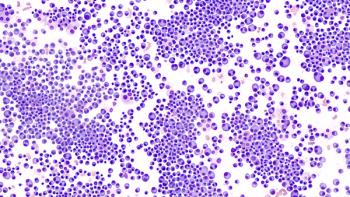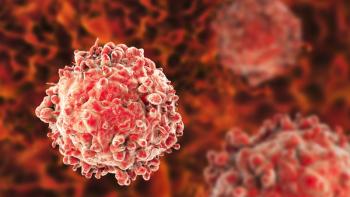
Study Results Advise Against Avelumab Maintenance Therapy in Endometrial Cancer Treatment
After the 3-arm, JAVELIN Ovarian 100 trial terminated at the interim analysis, researchers concluded that avelumab is not yet a suitable first-line treatment option for patients with advanced epithelial cancer.
The phase 3 JAVELIN Ovarian 100 trial (
Although the trial did not detect any new safety concerns, its results argue against the use of avelumab in the frontline treatment setting. Neither of the 2 primary objectives, to improve progression-free survival (PFS) in either 1 of the experimental groups, were met; therefore, the study concluded early in accordance with the predefined futility boundaries.
Alternative treatment options are still needed to safely treat patients with advanced epithelial ovarian cancer.
“Results from our trial and IMagyn050 suggest that the addition of an immune checkpoint inhibitor to frontline chemotherapy does not improve efficacy in an overall population,” the study authors wrote. “The negative outcome of our trial was unexpected and there is no obvious explanation for the results.”
Median follow-up for PFS was 10.8 months. Median PFS in the maintenance arm was 16.8 months (95% CI, 13.5–not estimable [NE]), 18.1 months (95% CI, 14,8–NE) in the combination arm, and NE with the control group (95% CI, 18.2 months–NE). The PFS stratified hazard ratio was 1.43 (95% CI, 1.05–1.95; one-sided P = .99) for the avelumab maintenance arm, and 1.14 (95% CI, 0.83–1.56; one-sided P = .79) for the combination arm, compared with the control arm.
JAVELIN OVARIAN 100 was a global, open-label, 3-arm, parallel, randomized trials that operated across 159 hospitals and included cancer treatment centers from 25 countries. There were 988 patients randomized 1:1:1; into 3 groups (avelumab maintenance, n = 332; avelumab combination, n = 331; control, n = 335). Participants aged 18 years older, with stage III to IV epithelial ovarian, fallopian tube, or peritoneal cancer who had received debulking surgery or were candidates for neoadjuvant chemotherapy, were eligible.
The 3 arms were treated as follows:
- The avelumab maintenance group received 6 cycles of carboplatin chemotherapy every 3 weeks plus paclitaxel at 175 mg/m every 3 weeks or 80 mg/m once a week followed by avelumab maintenance at 10mg/k every 2 weeks.
- The chemotherapy plus avelumab investigative arm received 10 mg/kg of chemo plus avelumab every 3 weeks, followed by avelumab maintenance every 2 weeks.
- The control group was treated with chemotherapy alone before undergoing an observation period.
The safety profile was deemed comparable to chemotherapy as a monotherapy. Nearly one-fifth of patients reported grade 3-4 anemia across all 3 arms: 21% of patients in the avelumab maintenance group, 19% in the avelumab combination group, and 16% in the control group. Cases of severe neutropenia were reported at similar rates, with 28% of patients in the avelumab maintenance group, 36% in the avelumab combination group, and 19% in the control group experiencing this adverse event (AE). In addition, 15% of patients in the maintenance group, 14% of the combination group, and 18% of the control group experienced grade 3-4 neutrophil count decrease.
Overall, only 19% of patients in the control group reported a serious AE at any grade, compared with 28% of patients in the maintenance group, and 36% in the avelumab combination arm. There was 1 treatment-related death in the maintenance group, and 1 patient death in the combination group because of disease progression.
Since the anti-PD-L1 monoclonal antibody failed to statistically improve responses in patients, the authors ultimately concluded that “The findings from this trial suggest that the addition of an immune checkpoint inhibitor to frontline chemotherapy does not improve progression-free survival in the overall population, highlighting that further study is needed to determine whether immune checkpoint inhibitors have a role in the frontline treatment of epithelial ovarian cancer.”
The study authors also noted a series of trial limitations, including, principally, that no predictive biomarkers were available to help guide patient selection. Secondly, since BRCA status were not periodically collected, it was not possible to ascertain any connection between BRCA status and patient outcome. Patients were also not assessed for homologous recombination deficiency, a recent biomarker of interest in epithelial ovarian cancer treatment.
Furthermore, because the trial was terminated earlier than anticipated, second-line therapy data was not collected in most patients, nor was longer term efficacy data provided. When the trial was stopped, maintenance treatment was discontinued and long-term follow-up was equally terminated, per the advice of the independent data monitoring committee and protocol steering committee.
Reference
Monk J, Colombo N, Oza AM, et al. Chemotherapy with or without avelumab followed by avelumab maintenance versus chemotherapy alone in patients with previously untreated epithelial ovarian cancer (JAVELIN Ovarian 100): an open-label, randomised, phase 3 trial. Lancet Oncol. 2021; 22 (9):1275-1289.
Newsletter
Knowledge is power. Don’t miss the most recent breakthroughs in cancer care.
















































































